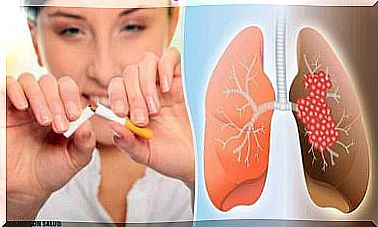Malnutrition And Its Problems

Malnutrition can lead to the development of chronic diseases caused by inadequate nutrition. Therefore, it is important to meet the requirements and ensure proper body function, to maintain a balance in the inner environment.
A varied and calorie-balanced diet is important for doing so. However, this is sometimes difficult because there is no access to food, and other times due to poor diet. In any case, malnutrition is bad for you.
What is malnutrition?
The first thing you need to be clear on is the actual meaning of malnutrition, which is not the same as malnutrition. The latter refers to inefficiency in calories and nutrient intake, while the former can cause deficits in important nutrients, even when a person meets their daily energy needs.
For this reason, many people develop malnutrition and are not even aware of it. This is because many of the symptoms appear in the medium term. The state of body composition does not necessarily vary significantly in this state, but it may.
An example of malnutrition would be a chronic iron deficiency leading to anemia. At least according to a study published in The Medical Clinics of North America .
Let us now discuss the different types of malnutrition a person may experience.

Nutrient deficiency
This happens when there is an energy deficit that causes a progressive loss of weight and muscle mass. The problem is exacerbated when a person does not meet the protein requirement. This is because the risk of developing sarcopia and functional problems increases. There is evidence of this in the research published in the Journal of Bone Metabolism .
Overweight
Some people consume more calories than they need, and it also harms their health. This is mainly because the body composition changes by getting too much fat mass. You may not be aware of it, but obese people have a higher incidence of chronic diseases.
Micronutrient deficiency
Even if you follow a balanced diet (from an energetic point of view), you can still get nutritional deficiencies that negatively affect your health. The aforementioned iron deficiency can, for example, lead to anemia. This is due to either intake problems or malabsorption.
Something similar happens with calcium – an essential mineral for bone health. Inadequate intake of it, and the maintenance of a low vitamin D level, can lead to the onset of osteoporosis. A study published in Nutrients discusses this thoroughly.
Similarly, you may experience health problems in the short term due to insufficient intake of certain vitamins. The most obvious case is scurvy, caused by a lack of vitamin C.
As you can see, a number of negative consequences of not meeting the requirements of each micronutrient are produced. It is therefore important to avoid restrictive diets, as their approach is complex. Therefore, it is often difficult to ensure an optimal supply of vitamins and minerals.
Health problems related to malnutrition
In addition to the situations mentioned above, usually associated with a particular nutritional deficiency, it is important to highlight the health effects of malnutrition in general. A person may experience the following problems.
Inefficiency in the function of the immune system
Lack of uptake of vitamin C, vitamin D and zinc adversely affects the immune system. At least according to some studies.
This is because differentiation of white blood cells does not happen properly and makes the body prone to infection.

Intestinal problems
The intestinal microbiota is one of the most affected when malnutrition occurs, according to studies.
In these cases, bacterial density and diversity are lost, causing metabolic and nutrient absorption problems. Thus, there is room for pathogenic opportunistic microorganisms to colonize and cause unpleasant symptoms.
Development of chronic diseases
Some of the micronutrients in the daily diet have an antioxidant effect. They can neutralize the production of free radicals and prevent them from accumulating in the tissue. This reduces the risk of developing complex pathologies, according to research published in Advances in Nutrition .
Improper intake of antioxidants will more likely lead to chronic health problems in the medium term. Cardiovascular disease is a good example.
The extent of the problem
As you can see, malnutrition, whether due to a lack of nutrients or an excess of calories, poses a health hazard. Sometimes the effects may not appear in the short term. However, a number of inefficiencies will occur at a physiological level and a condition for the organism to function properly.
For this reason, it is important to establish a balanced diet. You must try to maintain optimal body composition and meet the daily nutritional needs.
Malnutrition, a problem that is more common than it may seem
Unfortunately, more and more people in the Western world are experiencing malnutrition. It is common to find monotonous diets that have low quality nutrients, be it due to misinformation or neglect. This is reflected in the annual increase in chronic and complex pathologies.
To prevent this, people need to adopt healthy lifestyle habits from the earliest stages of life. Malnutrition can be corrected, but is only better to prevent it to begin with.









